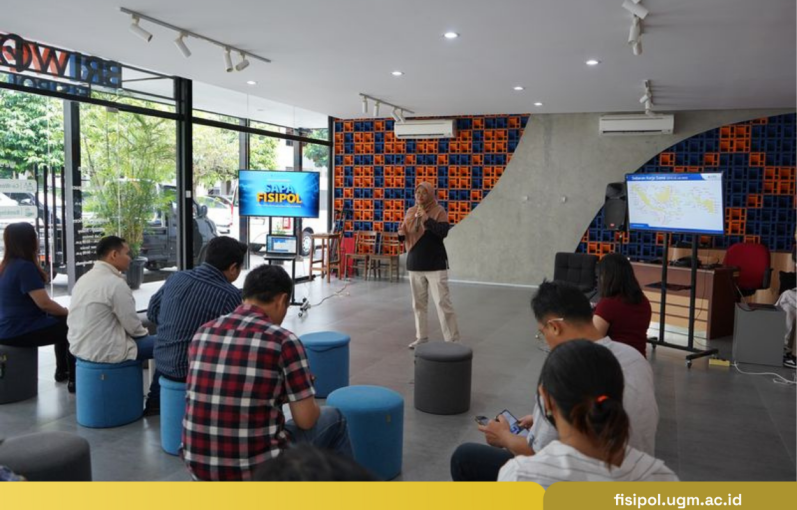
Yogyakarta, 25 July 2025 — To strengthen ties between academia and the media, the Faculty of Social and Political Sciences (FISIPOL) at Universitas Gadjah Mada hosted its first Media Gathering titled “Sapa FISIPOL (Silaturahmi dan Pemberitaan Aktual FISIPOL)” on Friday (25/7). This event served as a platform for dialogue and collaboration between the faculty and media outlets, recognizing the media as strategic partners in addressing societal issues.
At this inaugural gathering, FISIPOL introduced two of its active research centers that focus on digital and social issues in Indonesia: the Center for Digital Society (CfDS) and the Center for Capacity Development and Cooperation (PPKK).
Syaifa Tania, Executive Secretary of CfDS, shared the center’s commitment to fostering a healthy and safe digital ecosystem through public digital literacy initiatives.
“This year, our research is focused on three main areas: digital democracy and emerging governance models, human-centered AI, and environmentally sustainable technology,” she explained.
CfDS’s primary approach to translating research into impact involves responding to current and pressing issues. One recent study by CfDS explored the state of Indonesia’s labor ecosystem to support the development of green jobs—employment opportunities that are environmentally friendly. While sectors such as agriculture, waste management, and renewable energy show significant potential, the study also found that fair wages and worker welfare remain major challenges in achieving a just green transition.
Echoing CfDS’s mission, FISIPOL UGM’s PPKK also contributes to education, research, and community engagement.
Dr. Pradhikna Yunik Nurhayati, Deputy Director of PPKK, explained that the center aims to explore societal challenges through academic perspectives. By collaborating with regional governments, PPKK conducts field research directly within communities, with the findings serving as a foundation for policy recommendations.
“We don’t stop at research—we strive to turn our findings into real solutions for real problems,” Pradhikna emphasized. Since its founding in 2010, PPKK has actively partnered with various institutions, including national and local governments, domestic and international universities, and international organizations. Its core activities include community empowerment, education, and training programs. PPKK is committed to improving public welfare by equipping communities with the tools they need to improve their quality of life.
One of PPKK’s recent studies uncovered a troubling reality behind Indonesia’s social assistance (bansos) programs. While these programs are designed to alleviate poverty, the study found they may actually be contributing to its persistence. Alarmingly, some community members reported a desire to remain categorized as poor to continue receiving government support. This finding raises critical questions about the government’s commitment to long-term poverty reduction.
The Sapa FISIPOL discussion brought forward diverse perspectives from both media professionals and academics. It also served as a springboard for future collaborations, including media-engaged research and op-ed contributions. By building synergy and cooperation, both parties hope to spark innovation and drive initiatives that contribute to equitable and inclusive national development.
(/tsy)
